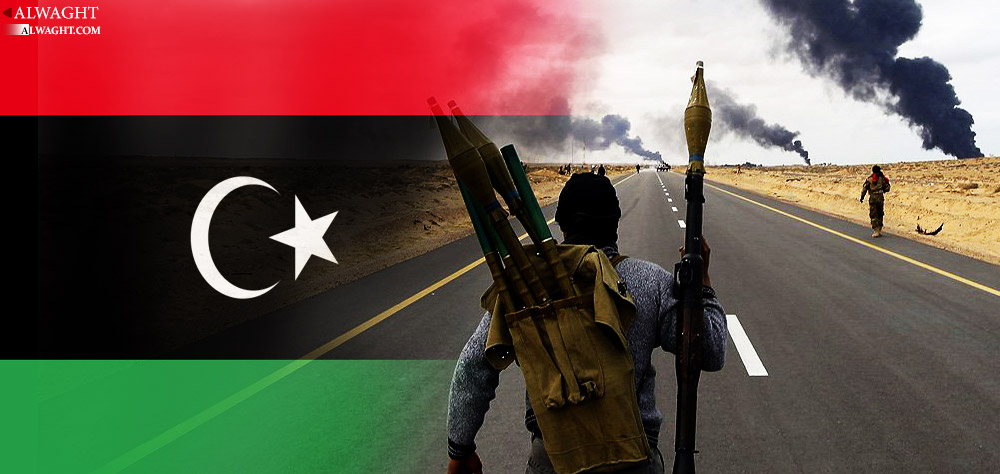Alwaght- The 2011 Tunisia and Egypt popular uprisings that protested the flagrant poverty, discrimination, and the elites' exclusion from the power orbit led to ouster of the two dictators Zine El Abedine Ben Ali and Hosni Mubarak from power.
The developments in the neighboring countries very soon aroused the Libyans, driving them to rally against Muammar Gaddafi, a dictator who ruled the country tyrannically for over 4 decades, standing firm against any efforts for transformation in the nation’s political and economic structures.
Immediately after outbreak of protests across the country, Gaddafi responded with an iron fist to people's uprising. Clampdown on civilians moved the United Nations Security Council to adopt Resolution 1973 in March 2011 to respond to the dictator's hard confrontation of the peaceful rallies. The US-led NATO was the UNSC's tool to react to Gaddafi.
The initial plan for deployment of Western air forces to Libya was to secure control over Libya and its rich oil sources; however, the NATO airstrikes soon obliterated Gaddafi's military. The NATO campaign ended in capturing and executing Gaddafi by his domestic opponents. His regime's fall ushered in a period of multi-fronted domestic war, instability, and insecurity all across the country, continuing to date.
With its tribal community, vast desserts, and lack of political parties' diversity and civil society, Libya failed to practice democracy during the rule of Muammar Gaddafi. This is why, the experts suggest, today and after collapse of the regime the revolutionary forces cannot stage dialogue and show toleration. The vacuum of power and a failure of the opposing political factions to immediately work out a political plan for the country’s future led to a devastating war and so rise of power-claiming factions in the capital Tripoli as well as cities of Sirte and Benghazi. Seeing the political parties fighting each other with no prospects of unity in sight, the al-Qaeda and ISIS terrorist groups, meanwhile, seized the opportunity and penetrated into the country, intensifying the fight and compounding the situation in the already deeply-divided Libyan society.
Foreign intervention, largely coming from Saudi Arabia, Qatar, and Turkey, even led to worsened chaotic Libyan conditions. Every foreign party sought its own goals in Libya. Riyadh wanted to boost Salafists' power in the country to propagate its the radical Wahhabi ideology there. This Saudi policy has already showed its results in Afghanistan, yielding nothing but deep division and devastating conflict across the country for several decades. On the other hand, Turkey and Qatar were similarly attempted to back Libya's Muslim Brotherhood currents in a bid to get toehold in North Africa.
In addition to these Muslim countries, the American-led West has also intervened in the crisis-torn country in a bid to hold under its control the country’s oil reserves. Abounding their humanitarian slogans, despite raising concerns about the influxes of Libyan refugees heading to the European countries via sea, the European leaders have done their best to persuade Egypt and Turkey to host the refugees coming from Libya and other war-hit countries, instead of contributing to a security and political settlement to the crisis that largely was caused by the NATO intervention.
With its 47 billion barrels of confirmed oil reserves, Libya ranks 10th among the countries with largest crude oil sources. Libya’s closeness to the European energy markets has caused the economic interests to overshadow the Western security and political considerations.
Meanwhile at home, the power-seeking groups, some from Libya while others from abroad with support from international and regional actors, are struggling to obtain as large control as possible on the country’s territories. Multiple militant groups, such as Fajr Libya, Ansar al-Sharia, Government of National Accord-backed militants, and the forces loyal to the renegade General Khalifa Haftar who used to serve as air force officer under Gaddafi, are actively fighting for further ground gains. Major militias on the battlefield declared allegiance to ISIS and al-Qaeda, turning the security and political situation on its head.
The analysts argue that the most threatening party in Libya conflict is ISIS whose cross-border thinking helps it recruit fighters from various countries. The terrorist group rose in Libya in 2015 by capturing Darnah, a port city in Libya’s east. The terrorist group then took further steps to gain more territories and has managed to seize control of Gaddafi’s hometown Sirte on June 2015. This was not the end as it pressed ahead and took parts of eastern city of Benghazi as well as ports and oilfields. But its noticeable presence did not last long as a league of forces mobilized potentials and launched their campaign against the terrorist group in May last year. They ejected the terrorists from Sirte in December, putting an end to ISIS saber-rattling in the country.
But Sirte recapture did not offer Libya a full escape from the ISIS risks. Last month, the Defense Minster Al-Mahdi Al-Barghathi talked about alliance of ISIS and al-Qaeda in south of the country, warning against the future perils the nation could face. Carnegie Institute in an analysis published in February 2017, titled Libya After ISIS, stating that "remnants of ISIS could still reconstitute themselves and sow serious troubles" in the highly disorganized country. The analysis introduces the fall of the central government in the tribal Libyan society as the certain cause of such trouble. The tribal nature of Gaddafi’s rule failed to constitute a united nation.
The trouble is even doubled for the pro-order parties. The rarely powerful and efficient Libyan army has to fight and eject a set of militant groups which enjoy foreign backing. Therefore, it is not expected that Libya could experience improved conditions in the short run, particularly because Libya partition by the US to obtain control over its strategic coasts on the Mediterranean Sea is only feasible in a state of chaos. This goal explains why the Western support for the Libyan people was only limited to launching military offensive and toppling Gaddafi, and then leaving the messy country on its own.



























